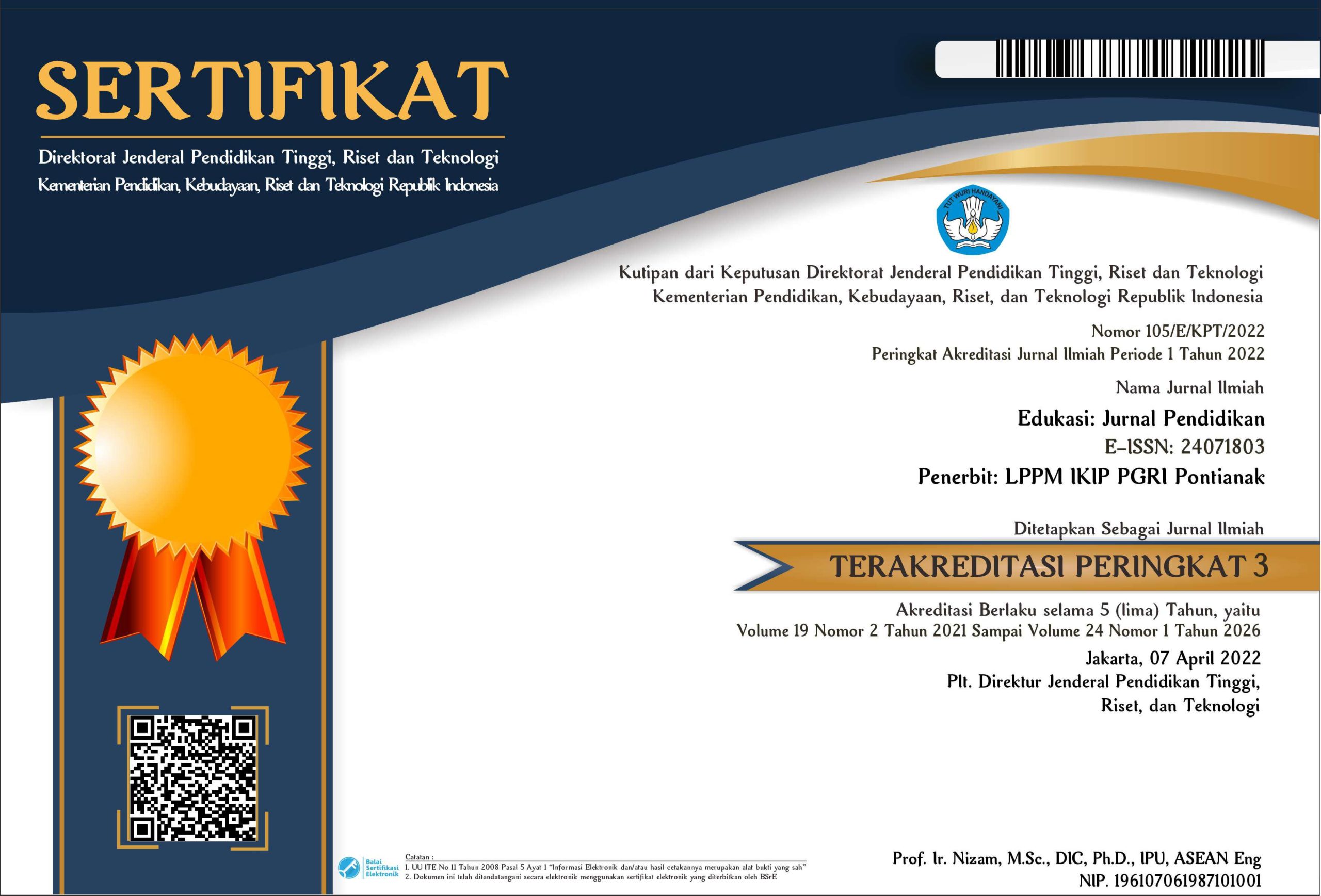PENGARUH KEPEMIMPINAN DIGITAL TERHADAP DISRUPSI INOVASI PEMBELAJARAN DALAM IMPLEMENTASI MERDEKA BELAJAR
DOI:
https://doi.org/10.31571/edukasi.v21i2.6519Keywords:
Kepemimpinan Digital, Disrupsi, Inovasi Pembelajaran, Merdeka BelajarAbstract
Penelitian ini bertujuan mengembangkan model kepemimpinan digital kepala sekolah dalam mengatasi disrupsi inovasi pembelajaran dalam implementasi merdeka belajar. Metode yang digunakan yaitu eksploratory sequential, sabjek penelitian berupa guru berjumlah 200 orang. Teknik yang digunakan berupa angket dan wawancara mendalam. Selanjutnya analisis data menggunakan statistik deskriptip, uji t, SEM dan analisis data kualitatif. Hasil penelitian menunjukkan model pengukuran yang diperoleh valid dan layak, sedangkan model struktural baik dengan Q2 (Stone Geiser Q-Square) yaitu 0,823, yang berarti model memiliki prevalensi prediksi yang tinggi. Sehingga, model struktural yang dihasilkan sangat layak digunakan untuk memprediksi. Kesimpulannya bahwa secara langsung kapasitas kepemimpinan digital berpengaruh positif dan signifikan terhadap disrupsi inovasi pembelajaran dan disrupsi inovasi pembelajaran secara langsung berpengaruh positif dan signifikan terhadap kebijakan merdeka belajar. Secara tidak langsung kapasitas kepemimpinan digital memiliki pengaruh positif dan signifikan terhadap kebijakan merdeka belajar yang dimediasi oleh disrupsi inovasi pembelajaran.
Downloads
References
Abubakari, M. S., & Suprapto, S. (2020). Educational Data Mining to Predict Students Performance Based on Deep Learning Neural Network. The 1st International Conference On Health, Social, Sciences, and Technology (ICoHSST 2020) 13, 1, 13–16. https://jurnal.poltekkespalembang.ac.id/index.php/icohsst/article/view/697
Avidov-Ungar, O., Shamir-Inbal, T., & Blau, I. (2020). Typology of digital leadership roles tasked with integrating new technologies into teaching: Insights from metaphor analysis. Journal of Research on Technology in Education, 0(0), 1–16. https://doi.org/10.1080/15391523.2020.1809035
Creswell, J. W. (2023). Research Design Qualitative, Quantitative, and Mixed Methods Approaches (6th ed.). SAGE Publications.
Ehlers, U. D. (2020). Digital Leadership in Higher Education. Journal of Higher Education Policy and Leadership Studies, 1(3), 6–14. https://doi.org/10.29252/johepal.1.3.6
Guntoro, M. (2020). Transformasi Kepemimpinan adaptif ditengah pandemi Covid-19. CENDEKIA Jaya, 2(2), 1–7. https://jurnal.untagcirebon.ac.id/index.php/cendekia-jaya/issue/view/14
Harmey, S., & Moss, G. (2023). Learning disruption or learning loss: using evidence from unplanned closures to inform returning to school after COVID-19. Educational Review, 75(4), 637–656. https://doi.org/10.1080/00131911.2021.1966389
Komariah, A., Nurdin, D., & Herawan, E. (2023). The Effect of Transformational Leadership and Madrasah Climate on Elementary School Teacher Performance. 4(2), 238–247. https://doi.org/10.46843/jiecr.v4i2.647
Leithwood, K. (2020). How School Leadership Influences Student Learning: A Test of “The Four Paths Model.” Educational Administration Quarterly, 56(4), 570–599. https://doi.org/10.1177/0013161X19878772
Lestari, N. W. (2021). Studi Kepemimpinan Digital Dan Kepemimpinan Kreatif Yang Mempengaruhi Inovasi Di Umkm Jatimulya Bekasi Jawa Barat. Parameter, 5(2), 97–106. https://doi.org/10.37751/parameter.v5i2.152
Liu, C., Ready, D., Roman, A., Van Wart, M., Wang, X. H., McCarthy, A., & Kim, S. (2018). E-leadership: an empirical study of organizational leaders’ virtual communication adoption. Leadership and Organization Development Journal, 39(7), 826–843. https://doi.org/10.1108/LODJ-10-2017-0297
Lockee, B. B. (2021). Online education in the post-COVID era. Nature Electronics, 4(1), 5–6. https://doi.org/10.1038/s41928-020-00534-0
Lubis, Y., & Rifma, S. (2022). Model Kepemimpinan Digital Dan Pengaruhnya Terhadap Kinerja Pendidik Dan Tenaga Kependidikan dalam Pandemi COVID-19. Ability: Journal of Education and Social Analysis, 3(3), 55–59.
Marnita, M., Nurdin, D., & Prihatin, E. (2023). The Effectiveness of Elementary Teacher Digital Literacy Competence on Teacher Learning Management. Journal of Innovation Ini Educational and Cultural Research, 4(1), 45–43. https://doi.org/10.46843/jiecr.v4i1.444
McCarthy, P., Sammon, D., & Alhassan, I. (2022). Digital Transformation Leadership Characteristics: A Literature Analysis. Journal of Decision Systems, 32(1), 79–109. https://doi.org/10.1080/12460125.2021.1908934
Meirawan, D., Komariah, A., Kurniady, D. A., Kurniawan, E., Asri, K. H., Sururi, Rahyasih, Y., Sutarsih, C., & Rahman, F. S. (2022). Leadership in fostering vocational school partnerships in the time of COVID-19. International Journal of Health Sciences, 6(May), 1300–1315. https://doi.org/10.53730/ijhs.v6nS6.10672
Pérez-Sanagustín, M., Kotorov, I., Teixeira, A., Mansilla, F., Broisin, J., Alario-Hoyos, C., Jerez, Ó., Teixeira Pinto, M. D. C., García, B., Delgado Kloos, C., Morales, M., Solarte, M., Oliva-Córdova, L. M., & Lopez, A. H. G. (2022). A Competency Framework for Teaching and Learning Innovation Centers for the 21st Century: Anticipating the Post-COVID-19 Age. Electronics (Switzerland), 11(3). https://doi.org/10.3390/electronics11030413
Prayuda, R. Z. (2022). Kepemimpinan Digital Kepala Sekolah Pada Era Digital : A Mini Review Article. International Journal of Social, Policy and Law, 3(1), 13–18. https://ijospl.org/index.php/ijospl/article/view/94
Purwanto, A., Purba, J. T., Bernarto, I., & Sijabat, R. (2021). Pengaruh Servant, Digital dan Green Leadership terhadap Kinerja Industri Manufaktur Melalui Mediasi Komitmen Organisasi. Jurnal Riset Inspirasi Manajemen Dan Kewirausahaan, 5(1), 1–13. https://doi.org/10.35130/jrimk.v5i1.174
Sahlberg, P. (2020). Will the pandemic change schools? Journal of Professional Capital and Community, 5(3–4), 359–365. https://doi.org/10.1108/JPCC-05-2020-0026
Yao, J. J. (2021). The significance of self-directed learning readiness, academic self-efficacy, and problem-solving ability among filipino nursing students. International Journal of Learning, Teaching and Educational Research, 20(10), 83–94. https://doi.org/10.26803/IJLTER.20.10.5
Downloads
Published
How to Cite
Issue
Section
License
Copyright (c) 2023 Adriantoni not avalaible not avalaible

This work is licensed under a Creative Commons Attribution-NonCommercial 4.0 International License.
Authors who publish in this journal agree to the following terms:
- Authors retain copyright and grant the journal the right of first publication with the work simultaneously licensed under a Creative Commons Attribution License (CC-BY-NC) that allows others to share the work with an acknowledgment of the work's authorship and initial publication in this journal.
- Authors are able to enter into separate, additional contractual arrangements for the non-exclusive distribution of the journal's published version of the work (e.g., post it to an institutional repository or publish it in a book), with an acknowledgment of its initial publication in this journal.
- Authors are permitted and encouraged to post their work online (e.g., in institutional repositories or on their website) prior to and during the submission process, as it can lead to productive exchanges, as well as earlier and greater citation of published work.















